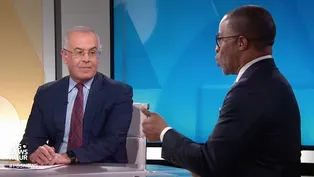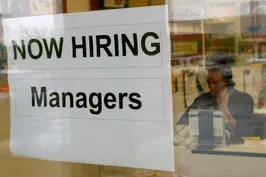
Research links severe morning sickness to hormone
Clip: 12/29/2023 | 10m 14sVideo has Closed Captions
Research uncovers link between hormone and severe morning sickness during pregnancy
The extent to which women experience morning sickness can vary, and those with extreme nausea and vomiting during pregnancy often face stigma when trying to receive care. While the condition is notoriously understudied, new research is giving hope for better treatment. Amna Nawaz spoke with several women impacted by the condition and one researcher working to understand the cause.
Problems with Closed Captions? Closed Captioning Feedback
Problems with Closed Captions? Closed Captioning Feedback
Major corporate funding for the PBS News Hour is provided by BDO, BNSF, Consumer Cellular, American Cruise Lines, and Raymond James. Funding for the PBS NewsHour Weekend is provided by...

Research links severe morning sickness to hormone
Clip: 12/29/2023 | 10m 14sVideo has Closed Captions
The extent to which women experience morning sickness can vary, and those with extreme nausea and vomiting during pregnancy often face stigma when trying to receive care. While the condition is notoriously understudied, new research is giving hope for better treatment. Amna Nawaz spoke with several women impacted by the condition and one researcher working to understand the cause.
Problems with Closed Captions? Closed Captioning Feedback
How to Watch PBS News Hour
PBS News Hour is available to stream on pbs.org and the free PBS App, available on iPhone, Apple TV, Android TV, Android smartphones, Amazon Fire TV, Amazon Fire Tablet, Roku, Samsung Smart TV, and Vizio.
Providing Support for PBS.org
Learn Moreabout PBS online sponsorshipwith extreme nausea and vomiting during pregnancy# often face stigma when trying to receive care.
While the condition is understudied, new# research is giving hope for better treatment.
Amna recently spoke with several women affected by## the condition and one researcher# working to underst AMNA NAWAZ: Anywhere from 50 to 90 percent of all# pregnant women struggle with morning sickness,## but, for a smaller group, about 2# percent, it can be debilitating or## dangerous.
The extreme nausea can lead# to malnutrition or hospitalization,## a condition known as hyperemesis# gravidarum, or H.G.
for short.
But new research has identified a single# hormone behind the condition, leading to## hope that there could be a new treatment.# More on that in a moment, but, first, let's## hear from some women who've lived through this# firsthand, two of whom are pregnant right n SARAH BREGEL, Maryland: My name is Sarah Bregel.## I'm a freelance writer When I was first pregnant with my daughter, Piper,## I was like a young mom.
I was 24 years old.# I had no idea what was going on.
The best## way that I can describe it is essentially# like you feel like you have been poisoned.
ARIEL MONTICURE-KLINE, Texas: My name is# Ariel Monticure-Kline.
I'm from Fort Worth,## Texas, and I'm a stay-at-home mom.
For me, on my first pregnancy and second, which# I had food or fluid in my body.
I was so violently# ill that blood vessels broke in my face, my eyes.
CELINE PINA, California: My name# is Celine.
I'm a department manager## at an art university.
And I'm# from Baker I will say, yes, this is my first pregnancy,# first time ever getting pr really came into this not knowing anything# about what to expect.
I ended up having to## go to the emergency room because I just --# I was, -- yes, I scared myself in the sense## that I couldn't get out of -- I felt like I# couldn't get out of bed.
I had zero energy.
I couldn't keep water, food down.
AUBREE WATSON, Michigan: My name is Aubree I was on TPN bags, which is total# nutrition.
It has everything you need,## so you don't have to actually eat.# I was on that for 12 hours a day.
SARAH BREGEL: No one ever said, there is this# thing that you may have.
No one ever brought## it up my first pregnancy until I was about halfway# through, and I stepped on the scale, and the nurse## looked at the number, and she looked at my chart# and she said, no, this -- that can't be right.
And I said, no, it is.
I'm still# not really keeping anything down,## and I had lost like 22 pounds.
ARIEL MONTICURE-KLINE: It wasn't until I# adam switching practices, because I didn't feel like I# was being taken seriously, that I was recommended## a home service.
The service here was called# Option Care here in Texas.
Highly recommend.
But they not only administered I.V.
They would# come to my house and teach me about a medical pump## which administered Zofran 24-7.
Zofran is actually# a medication given to chemotherapy patients.
AUBREE WATSON: I was literally throwing up 20# to 30 times a day.
I would throw up so much## that it would, like, ruin the inside# of my throat.
I would throw up blood.
And the only person I could really compare my# struggles to was with my dad, who's had cancer SARAH BREGEL: I had some moments# of enjoying being pregnant, but,## for the most part, it's -- pregnancy# is miserable for people going through## this.
There's not a lot of enjoyment.# It's about just making it through.
ARIEL MONTICURE-KLINE: I knew I wanted# to provide my daughter a sibling,## but I can't say that I was filled with anything# but fear when I found out I was pregnant And I'm still very much detached# from my pregnancy or the idea## that another baby's coming into this world.
CELINE PINA: I really wish my doctor# had told I wish he would have understood# the severity of the situation.
I feel like I -- coming into# this, I knew nothing about the## medication or how important it was# to not get to a really low AU BREE WATSON: I don't think I will have any more# children because of it.
I think it really affected## all of us, not just me, but even my partner.# I don't think we could go through that again.
AMNA NAWAZ: Dr. Marlena Fejzo at the Keck# School of Medicine at the University of## Southern California.
She's worked on this# breakthrough research and joins us Dr. Fejzo, welcome.
And just put this into identifying this one hormone?
DR. MARLENA FEJZO, Keck School of Medicine of# be cause it tells us that there is actually# something biol And a lot of people are mistreated who# have this condition and told that it's## all in their head or made to feel that# it's their fault.
And it is also a huge## breakthrough, because it gives us new ways# to potentially prevent it and to treat it.
AMNA NAWAZ: And what does that mean?# What could those new ways look like?## Is that a pill that one day may# be possibl DR. MARLENA FEJZO: Yes, so,# for the prevention strategy,## what is going on is that people who have# this condition of severe nausea and they have a predisposition for having lower# levels of this hormone prior to pregnancy.
So, to prevent it, we would give them# something to increase their levels to## desensitize them to the high levels of this# hormone that people have during pregnancy.
So,## that's one strategy.
And then# the second strategy is to lower## the levels of this hormone by blocking it# or blocking its action during pregnancy.
AMNA NAWAZ: And would that kind# of treatment just be for those who## suffer from this severe form of H.G., or# could it also be many women who suffer from# morning sickness during pregnancy?
DR. MARLENA FEJZO: I mean, first, I think we# have to try it on those most severe cases,## because those are the people who are going# to benefit the most and have the least risk.
People with hyperemesis already have a high# risk of adverse outcomes because of it,## adverse maternal and child outcomes.
So, for# them, it's worth it to test out these methods.## And then we would move into other people that# have less severe symptoms once we know that## everything is safe and we know how to do it# correctly.
But it's going to take some time.
So, yes, I think so eventually, to# answer your question, but, first,## we need to get things right.
And with those,# we will start with the most sickest patients.
AMNA NAWAZ: Dr. Fejzo, I know this is# obviously professional work for you,## but you do have a personal# connection to this specific work.
I wonder if you wouldn't mind sharing your# own experience with your second pregnancy.
DR. MARLENA FEJZO: Yes.
drink or move without violently vomiting.
It# was really like a form of torture.
I just had## to lie completely still week after week.
And# I lost so much weight.
My doctor tried seven## different drugs at one point at once on me, and# nothing really worked to get me to be able to eat.
So, finally, I was put on a feeding tube,## but it was too late, and I lost# the baby in the second trimes AMNA NAWAZ: I'm so sorry# for what you lived through.
But how does all of that inform your w DR. MARLENA FEJZO: Yes.
parents take turns changing my bedpan during# the day, my doctor had told me that he thought## that I just wanted attention from my parents# and that's why they were there at my house.
So I knew that wasn't the case, but I was too# weak to argue with him.
I couldn't even talk.## At one point, I had to use a buzzer because I was# so weak.
And so, afterwards, after I lost the baby## and I recovered, I looked into what was known# about it,and I saw there was so little known.
And so I knew that there was something# biological.
I heard someone say it## felt like being poisoned.
Yes, I could feel# something was poisoning me.
And so I wanted## to find out what that was.
And I decided# to dedicate my life to figuring that out.
And now we are finally here.# So it's very rewarding.
AMNA NAWAZ: You mentioned there wasn't a# lot of work done on this.
This has long## been understudied when it comes to this# issue or Why is that?
Why does it take# so long to get to these answers?
DR. MARLENA FEJZO: I mean, I think there are a## few reasons.
where people took thalidomide for this and# babies were born with limb deformities.
And so that really put a halt on pharmaceutical# companies investing in research on this,## as well as doctors in using medicines to treat it,## and also fear in patients of taking medicine in# pregnancy.
So that But, in addition to that, of course, it# is a women's health issue and a health## issue during pregnancy, and so I feel# like there is a lot of lack of research## into conditions that affect only women.# And so, hopefully, that is changing now.
AMNA NAWAZ: Dr. Marlena Fejzo from the# Keck School of Medicine at the University## of Southern California, thank you so much# for joining us today.
We appr DR. MARLENA FEJZO: Thank you for having me.
Brooks and Capehart on states blocking Trump from ballot
Video has Closed Captions
Brooks and Capehart on states blocking Trump from GOP primary ballot (10m 39s)
Election law expert on states blocking Trump from ballot
Video has Closed Captions
Election law expert on legal and political questions as states block Trump from ballot (6m 3s)
How the economy upended expectations of a recession in 2023
Video has Closed Captions
How the economy upended expectations of a recession in 2023 (5m 56s)
The images that defined the historic and tumultuous year
Video has Closed Captions
The images that defined the historic and often tumultuous year (4m 48s)
Russia launches one of its biggest air attacks on Ukraine
Video has Closed Captions
Russia launches one of its biggest air attacks on Ukraine in nearly 2 years of war (2m 49s)
Why reports of a surge in retail theft may be overblown
Video has Closed Captions
Why reports of a surge in retail theft may be overblown (7m 22s)
Providing Support for PBS.org
Learn Moreabout PBS online sponsorshipMajor corporate funding for the PBS News Hour is provided by BDO, BNSF, Consumer Cellular, American Cruise Lines, and Raymond James. Funding for the PBS NewsHour Weekend is provided by...

















